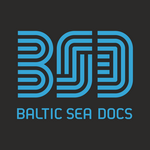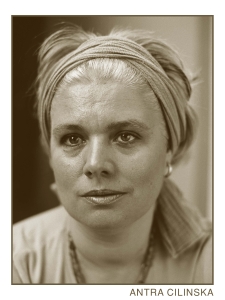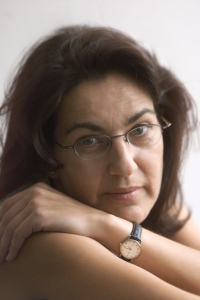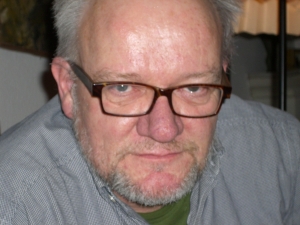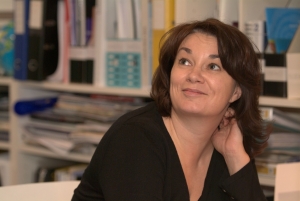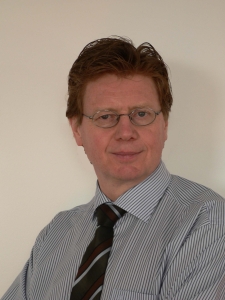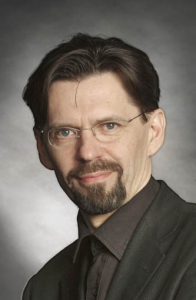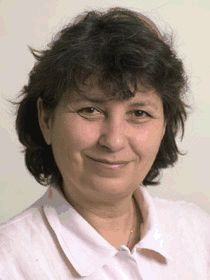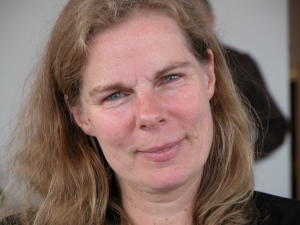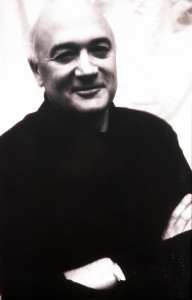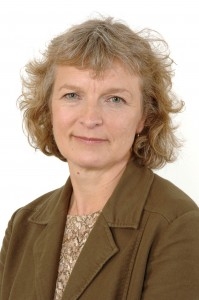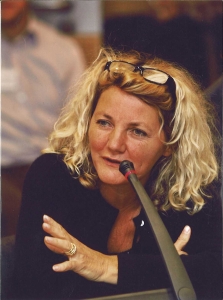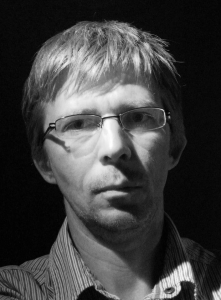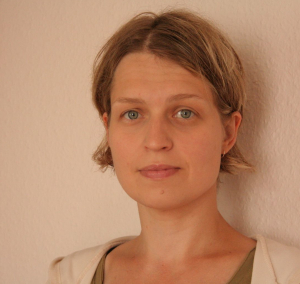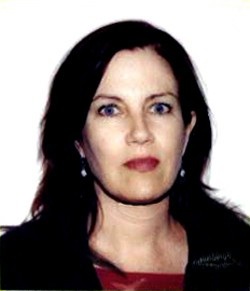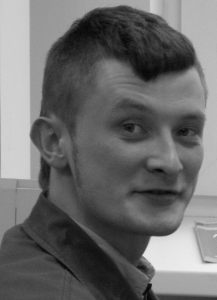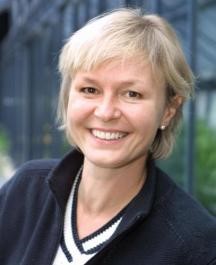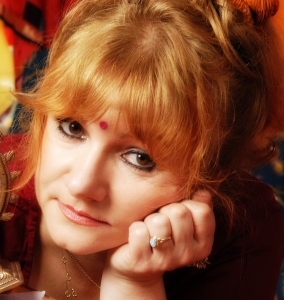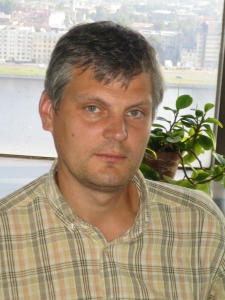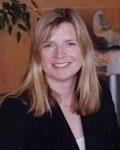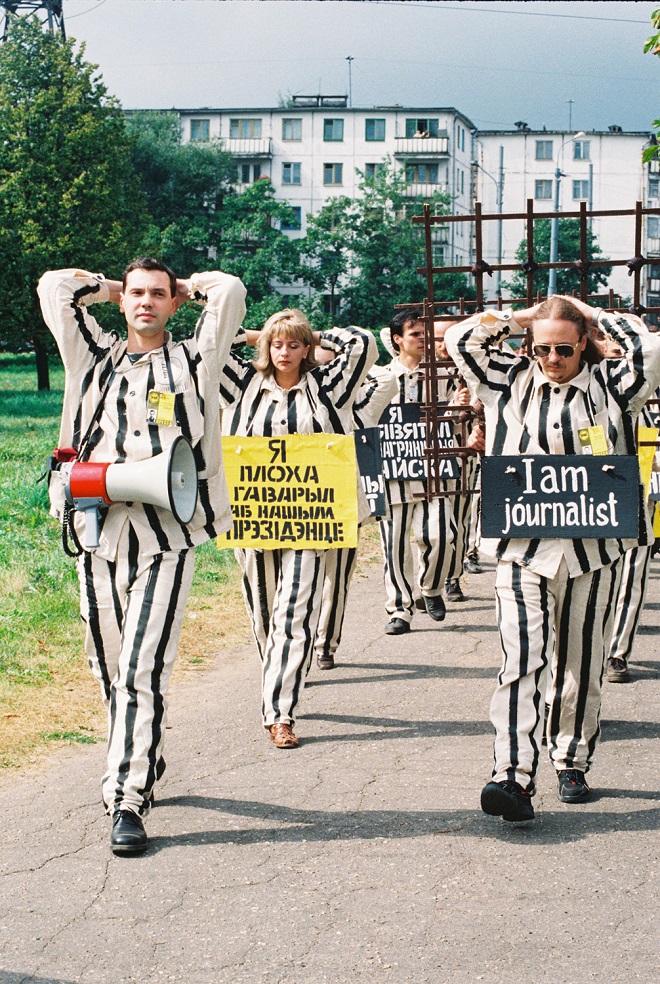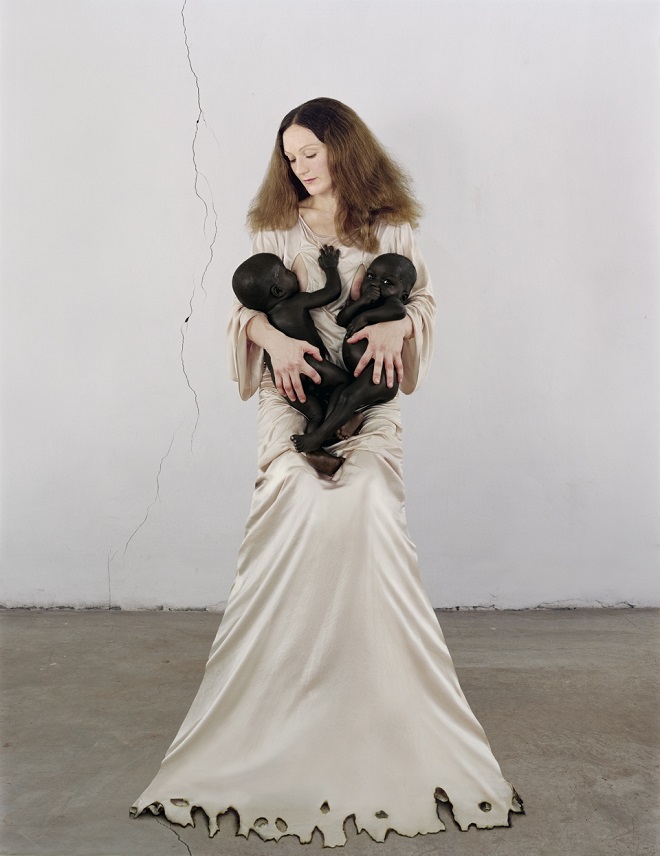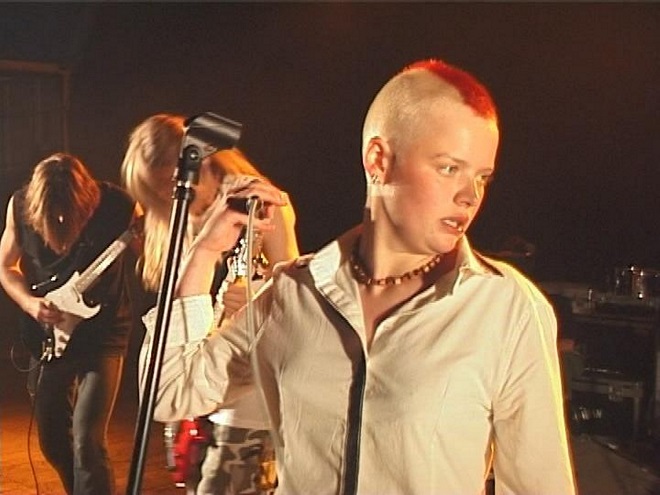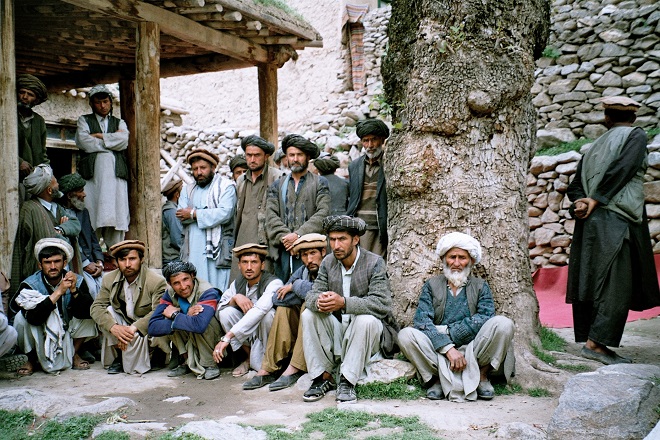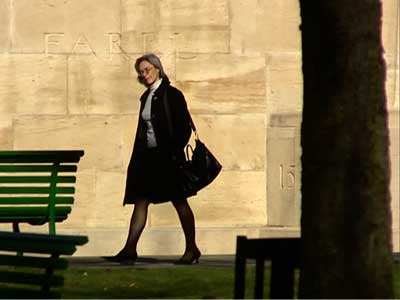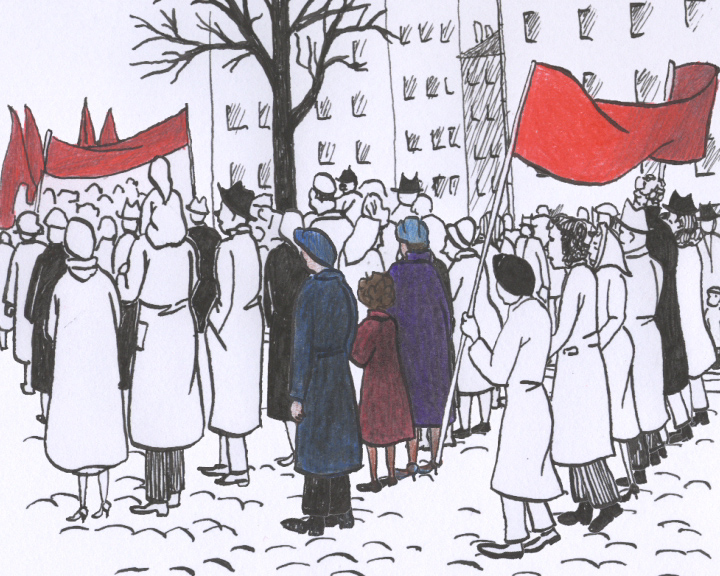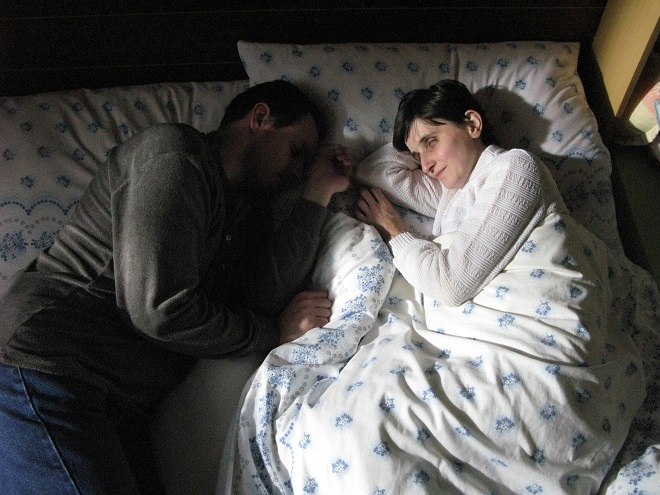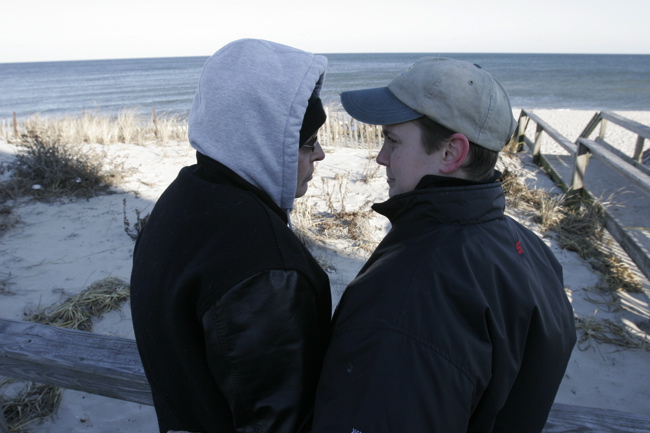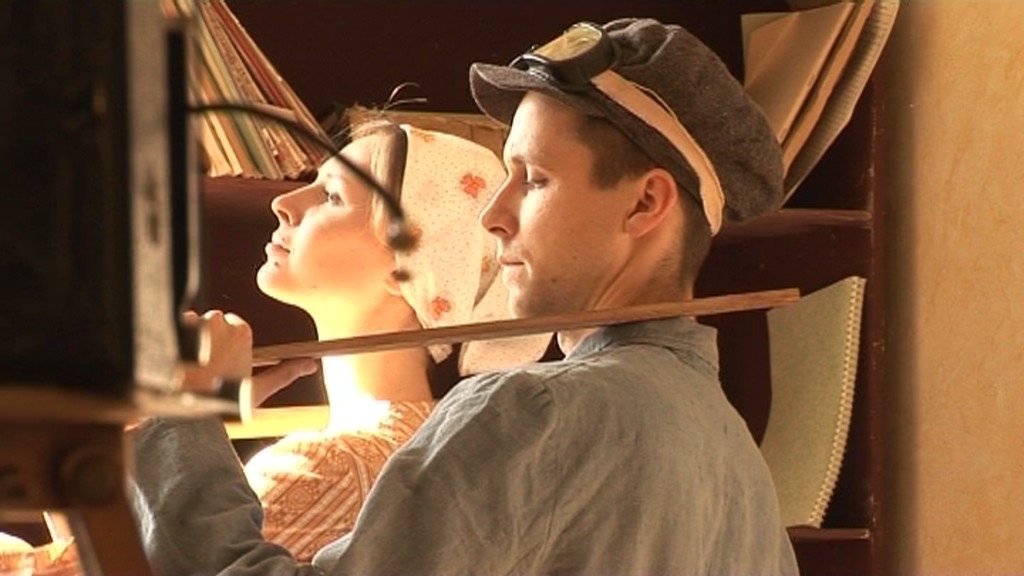Forum Projects
| Coutry of origin | Title of the project | Producer /Director / Company | Synopsis |
|---|---|---|---|
| ESTONIA | Minority Olympics | Aet Laigu, Agne Nelk
Kosmosemutid Ltd. |
Tibetan people and their dream of freedom on the backdrop of current events unfolding at the Beijing Summer Games and the separate Tibetan Olympics. Images from the Olympics, both the big and the small will alternate with rituals and traditions and the different life stories of the young Tibetan sportsmen. A traditional nomad family, a Chinese-influenced proletarian family and the Tibetan family living in exile represent three different faces of Tibet. Each person describes their vision of an ideal world and freedom in their own way. |
| ESTONIA | Prodigy Between the Notes | Marianna Kaat
Baltic Film Production |
Fifteen-year-old musical prodigy Alex Prior studies composition and conducting at the Saint-Petersburg Conservatoire. In order to secure their son the name of the Great composer of the XXI century, ambitious parents – Russian mother and English father – work at full capacity on the fields of the musical business. |
| ESTONIA | The Debt of Honour | Erik Norkroos, Kristina Norman
Rühm Pluss Null |
At the government’s command, a huge 24 meters high monument is being erected in the heart of Tallinn. After the removal of the Bronze Soldier the population of the country has been fragmentized by the issue of a monument. At the time when one community has been taken away the symbol of their identity, the government is erecting a monument to confirm the identity of the major national community. It’s the Victory Monument ofthe War of Independence (1918-1920). The monument is meant to become the new symbol of the country, is to unite all the people ofEstonia around the notion of freedom… but this is where the questions rise: Is thedebt of honour to the freedomfighters of the past to be payed by showing the today’s members of the Russian-speaking community their place? |
| FRANCE | The Yatzkans | Hélène Le Coeur, Anna-Celia Kendall-Yatzkan
Ideale Audience |
A story of a bloodline, that of the Yatzkans, starting with the youngest, – the narrator- who is coming to terms with the „remains” of her mother Tiya, and who pulls the threads that lead her back to her grandfather. Shmuel-Yacov Yackan, the pioneer of the Yiddish press in Warsaw. They both have left behind them traces of their culture; buried deep and are hard to decipher for anyone unable to read Yiddish, Polish, German or Russian. Yet their works render visible an intangible spiritual heritage. Thus the mysterious curves of the Hebraic letters printed on the thousands of yellowed pages once published by Shmuel-Yacov and Tiya’s powerful graphic art provide a tangible point of entry into a world almost destroyed. |
| FRANCE | Mirage of a Russian Village | Luc Thauvin
Cinergie Productions |
After leading a long itinerary through Russia for 10 years, I discovered a village called „Diki” (meaning ‘wild’ in Russian) which is situated in the region of Mordovia, 700 km East of Moscow. I met the last five inhabitants of this village in jeapardy, and, as I was going and coming back by train, I particularly got close to Nioura who now considers me like her son and tells me the uncommon story of the village. |
| GEORGIA | Lela Doesn’t Live Here Anymore | Ioseb Mtchedlishvili, Koba Tskhakaia
Sakdoc Film |
In the mountains of Georgia there is a tradition called stsorproba or tsatslaoba. This means that the family clan allows a man and a woman to have two types of relations: one is a family and another is Stsorproba or Tsatslaoba – it means to enjoy one’s self within the limits or, to put it more clearly – rather platonically than sexually. Stsorproba or Tsatslaoba is a purely Georgian tradition. Stsorperi can be both: a man or a woman. They have to protect each other and to take care of their Stsorperi. Stsorperi relationship starts in childhood by the oath of Stsorproba. After that they are allowed to sleep together, caress each other, but it is forbidden to make love or marry each other. |
| GEORGIA | Fourteen to Eighteen | Nato Kirvalidze, Levan Glonti
ProArt Productions |
The film explore the fates of boys in prison. What crimes have they committed? Is prison a place for children? The film documents both the personal journeys undertaken by inmates to find words that answer these questions, and the power of those words to move the outside world. The film talks about juvenile offenders, teenagers who often do not understand what they are getting into when they come in conflict with law. It reveals their differences, fear and hope. |
| GEORGIA | Lanchvalian Ariadnes | Kate Kalandarishvili, Mari Gulbiani
Midifilm |
This is a story of three Russian women, born and raised in different cities of Soviet Russia, who married Georgian men, and consequently ended up living in isolated, mountainous village of Lanchvali, considered to be the highest inhabited area in Europe. After living in severe conditions of high mountainous village for years, all three of them have dozens of their own interesting and thrilling stories to tell, revealing the features of local and their own culture and roots, and the positive or sometimes impossible interaction between them. |
| GEORGIA | Restaurant ‘Bakhmaro’ and Those Who Work There | Anna Dziapshipa, Salome Jashi
Sakdoc Film |
A place of personal tragedies. A place for two needless women. They live their faded lives in an orange-green colored restaurant in a small Georgian town. Freezing cold inside as it is outside. A door locked with a fork and set tables in the huge main hall waiting for customers that rarely come. Zoya and Nana spend their time in vivid conversations, where Nana’s tragedy is balanced by Zoya’s humor. And the location as well gives an opportunity for humor in the film; it is a humorous perception of despair. |
| GERMANY | Return to Lodz | Hans-Wolfgang Pausch, Daniel Petry
Context TV GmbH |
A family treasure, hidden in Lodz as a rain of Nazi bombs destroyed the city. 60 years later, the heirs return to claim it – only to find the land now belongs to the Polish state. Will the heirs of a Jewish family dynasty be able to recover the family treasure? And what exactly lies inside the crate that Grandfather buried in such a panic?Using this personal history as a back-drop, the film explores a very modern conflict: what rights do the dispossessed have today? In contrast to other post-Communist countries, and despite massive international pressure, Poland so far refuses to allow claims from those whose property was seized from them |
| LATVIA | Sounds that the Sun Makes | Inese Boka Grube, Dāvis Sīmanis
Mistrus Media |
Seventeen contemporary well known composers from all over the world who have agreed to compose songs for the Latvian youth choir Kamēr… The film investigates the world of sonic creation, the possibilities of musical interpretation, and tries to answer the rhetorical and deceptively simple question, “How is music created?” It examines the relationships between these composers, the environments from which they have arisen, and the choir that interprets the music they have created. The film discusses the impossibility of explaining music with words, though it allows viewers to get a little bit closer to the music by asking six of the contributing world-famous composers – Sir John Tavener of Great Britain, Leonid Desyatnikov of Russia, Pēteris Vasks of Latvia, Giya Kancheli of Georgia, Polina Medyulianova of Uzbekhistan, John Luter Adams of the United States, Ko Matsushita of Japan to try and explain what they have engendered. |
| LATVIA | Inventurers. To Kill Or to Die | Laima Freimane/Uldis Cekulis, Andis Miziss
Screen Vision/VFS |
Thousands of adventure lovers still read the bestselling TIGRERO, the story of the Latvian-born Sasha Siemel’s life in jungles of Brazil. He was the only known white man to learn to hunt them the Indian way – with spear. He became incredibly popular in the 1960s by starring in Hollywood and National Geographic films. |
| LATVIA | Snow Crazy | Uldis Cekulis, Laila Pakalniņa
VFS |
Downhill skiing is the most popular sport in Latvia despite the fact that there are no mountains. Indeed, there can’t be too much optimism in life, and this will certainly be an optimistic film about people doing what they want, defying geography and logic |
| LATVIA | Then and Now | Marta Bite, Andis Miziss
Ego Media |
In 2009 it will be twenty years since the collapse of the Soviet Union. Political system has changed in our country, we are used to focus on the Western way of life but not long ago our life was totally different; we had different values of life, possibilities, goals and dreams. What kind of values domineered then and what are prevailing now? This is what we want to demonstrate through the protagonists of our film with light nostalgia, benevolent humour and irony about ourselves. |
| LITHUANIA | Aging with Joy | Lukas Trimonis/ Nominum Films, Lithuania
Valdis Abols, Ilze Ramane / Vides Filmu Studija, Latvia |
Three elderly ladies meet every Tuesday at a Culture House in a suburb of Riga to take part in rehearsals with 40 other ladies of the “Granny Choir”. Despite their age, low income and health issues, they appear to know how to grow old with dignity, a sense of humour and, as it seems, even joy. |
| LITHUANIA | Canard | Dagnė Vildžiūnaitė, Giedrė Žickytė
Just a moment |
In the epoch of Conspiracy theories this film proposes a postmodern look at collapse of USSR and Singing revolution of Lithuanian nation. It is both a new theory and intellectual game suggesting that some historical events might have happened for the most obvious reasons with no secret “behind” them.1984, New Year’s Eve in Kaunas Lithuania. As a joke, a rock band named Antis is formed during a private party by a group of architects. Imposing make-up and props, stylized show, lyrics that roughly mocked the socialistic life created an aggressive caricature of Soviet propaganda. Antis soon became a star of the Singing Revolution against the Soviet regime. The leader of the group Algirdas Kaušpėdas – the eccentric but charismatic intellectual – became a political figure of the Independent Movement as well as the head of the National TV. Antis gave concerts in various places of the USSR, they are the first ones to obtain visas to go to the other side of the iron curtain, they visit Europe and the US. After Lithuania proclaims its independence in 1990, Antis disbands, its members resume their jobs and make successful careers. |
| LITHUANIA | Dance in the Desert | Živile Gallego, Agne Marcinkeviciute
Fralita |
A film about Lithuanian writer Jurga Ivanauskaite, a unique figure in contemporary literature in the Baltic states. So much so, that she has often been considered – and considered herself – an outcast from Lithuania’s staid art establishment, an image created as much by her own individual style and outwardly exotic personality as by the often condescending attitudes shown towards her by much of the Lithuanian cultural elite. Since her tragic death in 2007 from cancer at the age of 45, Ivanauskaite, as when she was alive, remains Lithuania’s best-loved writer. |
| POLAND | Sex, Church & Marriage | Ewa Anna Zukowska, Konrad Szolajski
ZK Studio |
This is a story about a premarital church training which is obligatory if you wish to get married in the Catholic Church in Poland… It is a peculiar institution of Polish Catholicism which aims to prepare the engaged couple for the sacrament of marriage and God-fearing family life. 80% of Poles get married this way. Are courses promoting premarital chastity as a form of contraception as well as eternal faithfulness only a ludicrous anachronism, an attempt to stop time? Or do they perhaps carry some timeless values for the modern man who is only obsessed with rampant consumerism and sexual gratification at all costs?We will try to answer this question with the help of a young couple who is getting married and the training coach and ardent Catholic, Clare who takes us into the world of traditional religious life. |
| POLAND | Poland 1939 – Parade Ground of the Master Race | Jacek Kubiak, Klaus Salge
Telenowa/Novemberfilm |
In this film we want to open an unknown chapter in the history of deportations which has not received much attention till now – neither in Germany nor in Poland. The displacement of polish citizens in 1939 from the western parts of Poland and the settling of the Germans from Baltic and other countries belonging to the Russian sphere in their houses.We believe that to tell this story of the first displacements in the Second World War is a necessity for the understanding between the peoples in a unitied Europe; to keep a common memory alive and to give a more historic and balanced view, specially between Germany and the states in the east, like Poland, Lithuania and Estonia. |
| POLAND | Terrorist | Krzysztof Kopczynski
Eureka Media |
The film Terrorist is a quest for an answer to a question: ”Where is Shamil Basayev?” – one of the biggest terrorists of the 20th and 21st century. Till today not a single irrefutable evidence has been found to prove his death. Moreover there are multiple versions of its circumstances. Basayev will be searched for by a man, whose whole life has been unwittingly changed by the friendship with the commander, and who is still haunted by the puzzle of his alleged death. Mirosław Kuleba journalist/sniper: the only Pole (not Muslim), who has fought in guerilla groups in Chechnya. He gave up journalism for Basayev. |
| RUSSIA | Return to Yourself | Yuliya Utysheva, Anna Tokareva | They are former homeless and drunkards. Society threw them into the street and a pensioner from a Karelian village Galina Nikonova took charge of them. Now they work for her. Galina Nikonova’s “artel” is a model of Russia, a state in a state. |
| RUSSIA | Cranberry Island | Anastassia Razlogova
Kamer-Ton-Media |
In the early 1990s, Marina and Yevgeni Tsaponin left Moscow for a small village. They dreamed of building their own paradise. Instead, they encountered post-Soviet disarray and poor land where only cranberries grow. We will observe our heroes for one year, as they decide whether to leave or stay. |
| SWEDEN | The Last Cod | Folke Ryden, Ryszard Solarz, Jerzy Sladkovski
Folke Ryden Production |
An untold story of how fishermen, scientists and decision-makers, all in good faith, are about to wipe out the Baltic Sea cod.The Baltic Sea environment affects the life quality of 90 million people. The threats are many, but the efforts to save the sea are spoiled by international disagreements and short-term interests. The current crisis is best told by showing the conscious and systematic extermination of the most valuable species in the Baltic Sea, the cod. Without the cod, the sea will be out of balance, the water fi lthy and an ancient tradition dead and our sea will never be the same again. |
| UKRAINE | Euro Chaos 2012 | Ella Shtyka, Dmytro Tiazhlov
New Kyiv |
The Ukrainian politicians are competing for the right to head the committee in charge of preparation and carrying out the final of 2012 European football championship. However, the decision whether the championships will be held in Ukraine or Poland is not taken yet. The level of preparation showed by Ukraine and Poland is not satisfactory, so the Eurofootball officials have to look for an alternative. Polish mass-media is discussing the scheme according to which Poland’s partner in the ambitious project would turn out to be its western, not the eastern, neighbour, that is, Germany. The other version tells that the head of the Union of European Football Associations Michel Platini has lately visited the Appennine peninsula and assured the local football front office that the Italians have one more chance to host the European championship. |
| UKRAINE | Transformation | Gennadiy Kofman, Dmitro Konovalov
MaGiKa Film Company |
It is a unique story about relations of 45 year old racketeer who is tired of his “business” and an incredibly fat (160 kg) young man, who hates his solitude and dreams of meeting a girl. Their meeting allows both of them to change their lives. One of them could become a coach and the other one would lose his weight. Watching their comic and tragic relations over a year, we can see how these two men from opposite worlds transform each other to fulfil their dreams. |
Tutors
JURIS PODNIEKS STUDIO, LATVIA
Antra Cilinska works as a director and producer from 1992. Before that she worked as an editor with the outstanding Latvian documentary film director Juris Podnieks, on such internationally known films as Is It Easy To Be Young?, Hello, Do You Hear Us? and Homeland.
In 1993, she was director-producer on Unfinished Business for Channel 4 (award at the Anthropological Film Festival) In 1994/95 – director-producer on 25 half-hour series on the history of Latvian films. In 1995 – producer on Accursed Town for Channel 4, director Andres Soot (Estonia). In 1996 – director-producer on Anatomy of A Provocation. In 1997 – director-producer on Girls from Chaka Street for TVE (UK). In 1996/98 – director-producer on Is It Easy To Be…? for Channel 4(UK) – prize at Leipzig Film Festival, FIPRESSI prize). In 1998/99 – a series of documentaries (6 x30’) Beyond Red for BBC with TVE (UK) and Internews (Moscow). In 2000 – director-producer of Baltic Saga. In 2001 – 33 films on the history of Riga (documentary, feature). In 2002 – Where Does It All Start?, a documentary about a famous Latvian set designer. In 2005 – producer on Dina. In 2006 – director of short fiction, Daddy, and director-producer on documentary, Us and Them. Currently Antra is working on 2 feature length documentaries Is it Easy to Be …? After 20 Years and Republic of the 4th of May.
COBOS FILMS
Born in southern Spain. After graduating as a social worker from the University of Seville, Carmen moved to the United Kingdom. She worked as researcher/location manager for the Natural History Unit and the Education department at the BBC and for several independent British production companies. In 2001 she became the director of her production company COBOS FILMS.
Her credits include feature documentaries: Forever among numerous other prizes Best Long Documentary, Dutch Film Festival 2006 and European Film Academy Award, Documentary 2007 – Prix ARTE. Cinema release in the Netherlands and USA. The Last Victory among numerous other prizes Best director, 2004 Infinity Festival Italy and European Film Academy Documentary 2004– Prix ARTE. Cinema release in UK and the Netherlands, Germany, Austria and Catalonia. Two Loves (co-producer) Dutch TV Academy Award in 2001, Nominated in the arts category for the Golden Rose at Montreux in 2001, short listed for EBU ‘The Golden Link Award’ 2002.
Since 2001 Carmen has been a regular tutor at EDN workshops (Bardonecchia, Lisbon, Barcelona DOCS, Buenos Aires, Santiago de Chile, Thesaloniki etc). Also tutor for different European organizations. Jury member Docs Lisboa 2004, Infinity Festival 2005, Joris Ivens Award IDFA 2006, Punto de Vista, Navarra 2008. COBOS FILMS makes film and TV documentaries, short films and is developing their first feature films with Danniel Danniel and Heddy Honigmann.
DOCUMENTARY CONSULTANT, DENMARK
Born 1947. Worked with short and documentary films for more than 20 years at the Danish Film Board – as press secretary, head of distribution and information and as a commissioning editor. Articles for national and international newspapers and magazines. Co-founder of Balticum Film- and TV-Festival, Filmkontakt Nord and Documentary of the EU. Travelled to European short and documentary festivals often to be seated as a jury member. Has given documentary courses and seminars in more than 30 countries. In 2004 awarded the Danish Roos Prize for his contribution to the Danish and European documentary culture. In 2005 awarded a prize at the DOCLisboa for his contribution to the international development and promotion of Portuguese documentaries. Since 1996 when it started, director of EDN (European Documentary Network). Given the EDN Life Achievement Award 2005. From 2006 free lance consultant and teacher in Danish and European documentary matters. Selector and consultant for the festivals DOCSBarcelona, Magnificent7 in Belgrade and Leipzig. Teacher at the documentary film school Zelig in Bolzano, Italy. Head of Studies at the European training programme Ex Oriente.Tutor at other training programmes like Archidoc, EAVE, ZagrebDOXPro and Discovery Campus. Writes at www.filmkommentaren.dk daily, almost.
Leena Pasanen, born in 1965, has studied Finnish language and literature at Oulu University. In 1988, she started her career as a journalist at the Finnish News Agency, first as a reporter and later as a political commentator in the House of Parliament.
In 1993, she joined YLE, the Finnish Broadcasting Company, where she worked as a reporter, political commentator, sub-editor and TV-presenter for the current affairs magazine programme on YLE TV1. After that, she was the Head of Documentaries for YLE TV1 from 1999 – 2000.
When YLE launched new digital channels, she was chosen as Head of Programmes, responsible for cultural, factual and fiction programmes in YLE Teema, a channel focused on culture, science and education. From 2004 she was also the Deputy Director of the channel.
In November 2005, she started her work as the Director of EDN, European Documentary Network.
She’s been a regular expert, tutor and lecturer for several training programmes – EDN, Discovery Campus, EURODOC and Television Business School. She’s a EURODOC graduate (1999), and she’s a member of the board of IDFA Forum, INPUT and the Bonnier’s Journalistic Award in Finland.
ETMA ACADEMY, FRANCE
Paul Pauwels has been working as a production manager and unit manager in feature film production from 1979 until 1987 when he founded his own production unit PERISCOPE PRODUCTIONS NV. With this company he has been producing with this company he has been producing documentaries from 1990 until May 2005 when he left the company and took up a position as a commissioning editor at VRT/CANVAS, the second channel of the Flemish Public Broadcaster. In December 2006 Paul Pauwels left VRT and after a short time took up the position of a project manager at the European Television Management Academy in Strasbourg, France. In January 2009 Paul Pauwels was promoted to become the director of the school, which will launch in October 2008. Paul Pauwels has been tutor and moderator for documentary training and pitching sessions in Greece, Scotland, France, Denmark, Spain, Norway, Holland, Portugal, Italy, Serbia, Israel, India, Croatia and Belgium. He has held the position of President of the Flemish Film and Chairperson of the European Documentary Network.
Decision Makers
YLE CO-PRODUCTIONS, FINLAND
Erkki Astala is the head of YLE Co-Productions, the department dealing with co-productions with independent producers for the YLE channels TV1, TV2, Teema and FST. For international pre-buys or co-productions the contribution is generally 2 000 – 10 000 EUR.
YLE TV1
The main YLE news channel, with a considerable share of current affairs and factual programming. In co-productions we look for personal, cinematic creative documentaries with human substance. Yearly: 15 – 20 pre-buys and co-productions.
Main documentary slots include:
Sunday Documentary at 21:15 (60’, open-end option) with various themes, co-production, in-house and acquisition (buyer Arto Hyvönen).
New Cinema, Sunday late night with an open-end, shorts, documentaries, fiction, experimental, something off the main stream – acquisitions, pre-buys and co-productions, in charge of strand – Sari Volanen.
History, Wednesday 19:30, 60′, acquisition (Nina Tuominen)
Science, Monday 19:05, 60′, acquisition (Nina Tuominen)
Nature, Saturday and Wednesday, 60’/30′, acquisition (Johanna Salmela)
Current Affairs, Wednesday 22:00, 55′, acquisition (Arto Hyvönen)
YLE TV2
Documentaries (www.yle.fi/d-projekti) on Tuesday 22:05 open-end strand, Dokumenttiprojekti – slot targeted towards a wide audience able to read cinematic form. In charge of strand – Iikka Vehkalahti. We are looking for strong human interest stories, domestic and international, dealing with social and political issues, set in the present time or historical. About 15 pre-buys and 2 – 3 co-productions per year.
YLE Teema
A channel dedicated exclusively to culture, science and education. Documentary strands include open-end Ateljee (in charge of strand – Outi Saarikoski), and one-hour strands for arts, science, history. Every Saturday, Teema has a theme evening, which includes documentary films, feature films and discussion programs dealing with the same theme from different perspectives. About 10-20 pre-buys and co-productions per year.
YLE FST
The Swedish language full-service channel of YLE. Three weekly strands for documentaries, in charge of strands – Jenny Westergård. Main strand FST-dokumentären, 60’ on Monday evening, for good creative documentary stories. On a yearly basis YLE FST buys, produces and co-produces 100-150 hours of documentaries in different genres, mainly of Scandinavian and European origin.
SVT, SWEDEN
Slot: Friday, weekly at 20.00 pm – 55 min.
Contents: Documentaries and Portraits within the field of: art, architecture, literature, music, dance, photography, film, theatre and history of culture. As the concept of “Beaux-Arts” nowadays has a much more diversified meaning, it is of great interest to SVT, Arts and Culture programmes, to co-produce projects that can be accepted by a younger generation of viewers. Therefore SVT, along with more traditional documentaries, especially look for unpredictable subject matters that reflect new currents in the cultural life of the world.
ARTE is a European public-service culture television channel. Its originality lies in the fact that it targets audiences of different linguistic backgrounds, especially French and German. It is composed of three entities: The Head office in Strasbourg; and the two members (responsible for programme production and delivery), ARTE France in Paris and ARTE Deutschland TV GmbH in Baden-Baden.
ARTE Deutschland TV GmbH, the German member of ARTE, reflects the federal structure of public broadcasting in Germany. The ARD and ZDF, both state broadcasting stations, are shareholders in ARTE Deutschland TV GmbH. They produce or acquire the programmes which constitute the German contribution to ARTE telecasts. While the ZDF accounts for 50% of the German share and supplies all genres, including cinema features, TV dramas, documentaries and theme evenings, theatre and opera productions, ARD has established an arrangement whereby its individual stations focus on different specialities.
ARTE is financed, in France and Germany, through the television license fee.
Nick Fraser has been editor of Storyville since it started in 1997. He describes it as “a good deed of the BBC,” and, he says, “films shown on STORYVILLE come from anywhere in the world, and deal with any subject – this is a relatively new idea.”
Nick Fraser was born in London in 1948, to a British father and French mother. In 1969 he graduated from Exeter College, Oxford with a first class degree in English. He has worked as a reporter and television producer and editor. He has lived in London mainly, but also New York and Paris. Books published by him include a biography of Eva Peron, and The Voice of Modern Hatred, a study of extremism and race hate in contemporary Europe. Short Books published his book The Importance of Being Eton in 2006. He admits to a “persistent, undefeatable belief in the power of reason”. He is proud of being a contributing editor of Harper’s Magazine in New York, “the best magazine in the world”, in which his essays about the BBC, Isaiah Berlin and anti-Americanism have been published. He likes to travel, and be at home in West London.
In recent years, Nick Fraser says his primary distraction and obsessional activity has been watching documentaries. “They are getting to be the rock and roll of our time” he says “They are the most promising cultural form. They may not always fill the right slot, or get the ratings we’d like; but they do tell us what the world is like. The greatest discovery I’ve made at STORYVILLE is that you cannot stop brilliant documentaries from being made – by now they exist independently of television. Someone will always be able to make a film, even if we in television don’t finance it. But of course that doesn’t mean that we shouldn’t be financing good films” In recent years films shown on STORYVILLE have won many major awards, including an Oscar, a Grand Jury prize at Sundance, several Griersons and several Emmy’s. “It wouldn’t be right for me to say which is my favourite STORYVILLE,” he says. “I’ve liked them all – they’re all great – that’s why we’ve shown them.”
Flora has worked for over 20 years in broadcast television, much of this time working with independent television companies as series producer, producer, line-producer, field-producer, or production manager on some one hundred productions including arts, current affairs, social history, science and wildlife documentary films. She was Director of the Edinburgh International Television Festival (1990 – 92), the first chair of the Production Managers’ Association (1991), Programming Manager of Discovery’s The Learning Channel (1992/3). Prior to joining AJE Flora worked as Producer and latterly Series Producer on Unreported World, Channel Four’s flagship foreign affairs series (2000-2005).
AL JAZEERA ENGLISH is the 24-hour English-language news and current affairs channel. With broadcasting centers in Doha, Kuala Lumpur, London and Washington DC, the channel will set the news agenda, bridging cultures and providing a unique grassroots perspective from underreported regions around the world to a potential global audience of over one billion English speakers.
The station broadcasts news, current affairs, features, analysis, documentaries, live debates, entertainment, business and sport. Al Jazeera English is part of a growing network that is now extending a fresh perspective from regional to global through accurate, impartial and objective reporting.
As of 2007 Mette is the Head of Documentaries and Co-productions at DR TV. Before that as of 1991 Mette has been working at TV 2/DANMARK as Commissioning Editor of documentaries & factual programming as well as Head of Sales & Co-production, that became the largest distributor in Scandinavia. The output included drama, animation, series, children programmes documentaries and formats. TV 2/DANMARK Sales has a world-wide catalogue including filmmakers from all over the world.
From 1988 to 1991 Mette was a Production & Financing Controller at Nordisk Film Broadcasting dealing with programme development, budgets, product sales (for both TV 2/DANMARK and DR), production planning, controlling etc. Mette also was as a member of the management strategy group at Nordisk Film Broadcasting. Mette holds a Bachelor degree of Commerce specialising in accountancy, has also been working as a music director, music manager and head of production in animated feature films, video games and commercials.
ESTONIAN FILM FOUNDATION (EFF) was established in 1997 by the Government of Estonia as a private legal institution with the task of financing Estonian film production, establishing and developing international film contacts, promoting Estonian films at home and abroad, supporting the training of Estonian filmmakers and audiovisual professionals, and creating and maintaining Estonian film databases. The EFF is financed from the state budget. The EFF budget for 2008 is 65.5 million EEK (€ 4.2 million) to be used for financing the national film production, including features, shorts, animation, and documentaries (€ 613 400). International co-productions are supported only with Estonian co-producers on board. The Estonian Film Foundation also represents Estonia at international film festivals, markets and organisations. Estonia is a member of MEDIA 2007, European Audiovisual Observatory and Eurimages. The EFF operates under the auspices of the Estonian Ministry of Culture.
The number of co-productions in the documentary field per year is approximately 5 or 6.
General: Estonian Television is the biggest Estonian language broadcaster in the world. Acquisitions: Average yearly budget for acquisitions – ca 1 million EUR Co-Productions: Mostly local co-productions but open to pre-buys (for creative documentaries mainly). Can only support international co-productions involving an Estonian independent production company. Estonian Television initiated Project Estonian Stories in 2003, with 12 documentary films per year, 30 minutes each, co-financed by the Estonian Film Foundation, Estonian Television and Culture Endowment, and produced by independent film companies. The main aim is to make creative stories with a fresh look at Estonian life – films should also have an archive value. Main documentary film slots: Current affairs docs: weekly, Monday at 22:30, 1-hour dokkaader (docframe): creative author films, weekly, Wednesday at 22:25, open end examples: 3 Rooms of Melancholia, Czech Dream, Swenkas, Guerilla Girl, Story of the Weeping Camel. Also, each month 1 new Estonian documentary is released. AegRuum (TimeSpace): scientific docs with human perspective, weekly, Saturday at 17:05, 1-hour Natural History: Saturday at 19:00, 1-hour Music documentaries: Thursday late night slot, 1-hour
A Program Manager for ITVS International, which facilitates an exchange of compelling documentaries between the United States and other nations and promotes programming that transcends stereotypes and headline news to provide international television audiences with new insight into the cultures and people that comprise our global community. We work with independent producers to create and present documentaries taking creative risks, advance issues and represent points of view not usually seen on public or commercial television.
Kane began her career as an actress and has appeared in film, theatre and television in New York, Los Angeles and regionally in the U.S. She joined Sundance Channel programming team in 1996 where she worked in Acquisitions and as a Documentary Programmer. During her tenure, Kane championed the celebrated series, The Staircase, as well as the Emmy-award winning documentary, In Rwanda We Say, the Family That Does Not Speak Dies…. Instrumental in the creation of DOCday, she also programmed world cinema and produced on-air specials such as In Short: Witness, Arte Latino, NY, NY, A Taste of Iran and Not Every Picture Tells a Story: Classic & Contemporary Work from the American Underground.
She left Sundance Channel in 2005 but continued as a consultant; in addition Kane worked in development on several documentary projects: To Be Heard, Ice People (also Associate Producer), Who’s Afraid of Lynne Stewart?, By Bread Alone: In the Company of Food Heroes and Leiber-Stoller: The Longest Running Argument in Show Business.
Her other clients included Cactus Three, LINK TV and iThentic: Made-for-Mobile. She taught in a New York City after-school program, College Now, holding both writing workshops and documentary screenings for her students to generate discussion about current affairs.
ITVS International
The next International Call deadline will be February 6, 2009.
ITVS International promotes programming that transcends stereotypes and headline news to provide international television audiences with new insight into the cultures and people that comprise our global community. We work with independent producers to create and present documentaries that take creative risks, advance issues and represent points of view not usually seen on public or commercial television. ITVS International commissions and acquires programs, and we offer an annual open submission process- International Call – for independent producers from countries outside the U.S. to apply for financial support, production and distribution services. ITVS International is funded by the International Media Development Fund made possible by the William and Flora Hewlett Foundation, the Ford Foundation, and the John D. and Catherine T. MacArthur Foundation.
Lithuanian National Radio and Television – LRT is Public broadcaster. LRT operates 2 national TV channels, 1 satellite channel and 3 Radio channels.
The TV first – has few slots, which consist of wild-life and travel type of docs.
The LTV2 is a culture channel with 52 min. slots for docs.
The LTV World is channel for Lithuanians in United States with 52 min. slots for docs about Lithuania.
Number of co-productions per year, average budget
LRT, its Film Studio department is making approx. 8-10 films/year. 6-7 of them are national or international co-productions. LRT’s input mostly is technical equipment, and technical assistance. The financial input is not available.
Special demands and new initiatives
The preferences in international co-productions are given to projects related to historical, cultural, political, social issues, with stories related to Lithuania.
The aim of Het Vrije Woord is creating informative programmes on topical matters from a humanist point of view. Above all, we attempt to approach our television viewers as frank adults, and special attention is given to situations where openness is being limited. The themes treated are analysed from an ethical, and not from a political or party-political standpoint.
MITTELDEUTSCHER RUNDFUNK (MDR) is part of the ARD-network located in Leipzig / Sachsen. It offers a wide variety of TV for all viewers in its region, the middle of Germany. The range extends from regular news and sports broadcasts to entertainment shows, political magazines, cultural broadcasts, feature films, historical documentaries, religious and musical broadcasts. It offers a 24-hour programme and reaches a market share of nearly 10 percent of the audience.
MDR also contributes to the nation-wide public broadcast channel ARD – in all genres of programming.
Documentaries hold a strong position here: all in all, 50 hours are being produced p.a. for ARD, MDR and arte. Emphasis is on the history of World War II, the Cold War and the history of the former German Democratic Republic. A new trend here, however, is looking at the medieval and pre-medieval ages, archaeological and mythical traces.
A strong emphasis is also put on projects that look towards the Eastern European countries, their history, people and culture.
MDR Television needs two weekly documentary slots to be served, and here the programme philosophy is the same as for the ARD slots. We do in-house productions, international co-productions and programme licensing.
Rada Šešić, born in Croatia, worked as a film critic and director of several short and documentary films in Sarajevo, Bosnia and Herzegovina. In 1993 she came to the Netherlands and since then is based in Utrecht. She established herself as a specialist for South Asian cinema and Eastern European film. Šešić is a guest lecturer at the University of Amsterdam and works as a programme advisor for the International Rotterdam Film Festival and the International Documentary Filmfestival Amsterdam. She is also a programmer of Kerala Film Festival (India) and head of the Regional Documentary competition at the Sarajevo Film Festival. Since the beginning of Jan Vrijman Fund (part of IDFA) that supports creative documentaries she is in a selection commity and since recently in Hubert Bals Fund (part of IFFR) that supports feature fiction films as well as in the Dutch Fund STIFO, that supports television coproduced creative projects. She is also a lecturer at the Dutch Institut for the Film Education. Recently she became a main programmer of the International Bukurest film Festival, Romania and a selector of the international docs at the Sofia Film Festival, Bulgaria. Šešić still works as a filmmaker and a film critic.
Latvian Television is the national broadcasting company owned by the state and has two channels – LTV1 and LTV7. At the moment there are several 52 min and 26 min documentary slots per week. LTV1 has daytime Sunday documentary slot focused only on local and regional documentaries – Latvian and Baltic. Latvian Television also looks for National Geographic, Discovery style documentary films and series produced worldwide. The topics of programs are varied, and include history, civilization and culture, travel and adventure, wildlife and nature, lifestyle, sports, science and discoveries, as well as sometimes author documentaries of actualities.
Proinsias began with TG4 in 1996 and over the years has been responsible for commissioning programming across all genres. Currently concentrating on Documentaries, (stand alone and series), drama, cultural programming, schedule events and promoting co – productions to fulfill the TG4 remit.
TG4, or TnaG as it was then called, was established as a broadcaster/ publisher by the Irish government in 1994 to provide an Irish language television service broadcasting throughout the nation. Broadcasting commenced at Halloween 1996 and from an initial limited base has grown to the position where it is currently broadcasting 19 hours per day to an average audience of 3.5% of the population. The Irish language core schedule, which is financed from a government grant of just over 28 million EUR per year, broadcasts 5 – 6 hours per day while the remainder of the schedule is made up of acquired programmes in English and other languages which are financed from advertising and sponsorship. TG4, which had been established as a subsidiary of RTÉ, was established as an independent entity on 1 April 2007.
TG4 commissions an average of 350 hours of programming in all genres from the independent sector.
Film Programma IS IT EASY TO BE DIFFERENT?
In Belarus, mass media that ventures to criticize President Lukashenko is shut down, journalists are arrested, convicted, or even worse – they simply disappear. Freedom of speech that was still recently every journalist’s weapon has now become the reason for endangering career, family and even life. The film tells the story of the daily lives of Belarusian journalists and the dilemmas they face between conscience and temptation, fear and self-respect. Many journalists have been forced to abandon their profession while others have emigrated, but there is still a large number, who, despite the obstacles created by the authoritarian regime, continue to fill their professional mission – as the “guard dogs” of democracy.
According to the 2008 “Freedom House” annual review surveying 193 countries to determine political and civil rights (free, partially free and not free), Belarus, along with 42 other countries, was placed in the most repressed group of nations.
(http://www.freedomhouse.org/uploads/fiw08launch/mof2008.pdf).
Directed by Aleh Dashkevich
Produced by ADKpradukcyja
Director Pietra Brettkelly was in the Darfur region of Sudan working on a documentary when she happened to meet world-renowned artist Vanessa Beecroft. The film follows Beecroft’s intentions to adopt orphaned Sudanese twins, and how this bleeds into her art and personal life. It is becoming more and more apparent that with Vanessa there is no boundary between life and art. Her obsession with adoption drives her marriage to a breaking point and fuels her controversial art, raising troubling questions about exploitation, culture clash, and the imposition of the West on Africa. Art Star and the Sudanese Twins is a brutally honest, remarkably self-critical reflection on foreign adoption that touches unexpectedly on issues of alienation and loneliness.
The film’s premiere was at the 2008 Sundance Film Festival in the US where it triggered widespread discussion.
Directed by Pietra Brettkelly
Produced by Pietra Brettkelly, New Zealand Film Commission
Award winning director Miroslaw Dembinski presents a new documentary about the last European Communist regime in Belarus. There is a monument of Lenin in every town in Belarus, and you can find the hammer and sickle on every street. The powerful symbol of Soviet power is on sugar packets in cafes and even stamped on eggs. In this strangely absurd country of Soviet relicts, live real people. The older generation, afraid of change, are subjected to regime propaganda pressure, while young people dream of freedom. This documentary presents young rock music bands that are in opposition with Lukashenko’s regime. They express their attitude to the surrounding reality through their music, clothes and behaviour. Rock music is there to express their independence. “If you are afraid, nothing ever changes”, sings one of the rock bands in Music Partisans.
Miroslaw Dembinski’s last film, A Lesson of Belorussian (2006), was also dedicated to the youth of Belarus who are opposed to Alexander Lukashenko’s regime. A Lesson of Belorussian was screened at the Forum in 2006.
Directed by Miroslaw Dembinski
Produced by Film Studio Everest
In April 2005, the world heard the news that a 29 year-old Afghan woman named Amina was stoned to death for the crime of adultery. The story of this powerful documentary begins five years earlier and follows Amina, whose marriage was arranged by her parents, as is quite common and rooted in tradition. Soon after the wedding Amina meets Karim and falls in love. They start seeing each other in secret, but are eventually caught together and accused of violating the law. This engrossing film chronicles their affair, trial and punishment with piercing candour.
Several countries (Afghanistan, Nigeria, Iran, Sudan, Malaysia and others) still practice stoning as a form of punishment, usually for adultery.
Directed by Krzysztof Kopczynski
Produced by Eureka Media, Telewizja Polska S.A., Society Films
On October 7, 2006, Vladimir Putin’s 54th birthday, journalist Anna Politkovskaya is shot in the lift of her Moscow home. Anna’s death is a personal tragedy: she has just learned that she is to become a grandmother. But the murder is also a political act, for Politkovskaya was the President’s fiercest critic. Why was she shot in cold blood, this elegant woman who was always on the side of the weak and those who had no rights? Was it because of the stance she took against the war in Chechnya – a war that was virtually ignored in the world at large and yet became a turning point in Anna’s life? – Letter to Anna – is a personal quest, but also a political film.
Director Eric Bergkraut met Anna Politkovskaya in 2003 while making a film about human rights activists in Chechnya. The film, Letter to Anna, contains many of the conversations they had at that time, as well as interviews with Boris Berezovsky, Garry Kasparov, the editor of Novaja Gazeta Dmtriy Muratov, and Anna’s children Ilya and Vera. The film is narrated by Susan Sarandon.
Directed by Eric Bergkraut
Produced by p.s.72productions, zero one film
The first Latvian documentary animation film is based on unique drawings from the diary of 80 year-old Irīna Piļke, encompassing a period from the end of WWII until the beginning of the 80s. These drawings, where the author appears as a little bird, show everything around her…everything we call life. Through the eyes of the little bird, Chiz, we get a glimpse of an earlier age.
Little Bird’s Diary is noteworthy as the first Latvian documentary animation film. Film won a National Award Lielais Kristaps for the Best Animation Short and a FIPRESCI Prize in 2007.
Directed by Edmunds Jansons
Produced by Studija Centrums
Blind Loves is a film about love between blind people. Love can be soft, love can be silly, love can be blind at times… To find one’s place in this world is not an easy thing to do for people with good sight, but how much more difficult can it get for somebody who is blind? The “view” of blind people is often pure and essential, and very often witty. It uncovers new dimensions in the meaning of happiness.
Blind Loves was selected for the Cannes Film Festival 2008 in the Directors’ Fortnight section dedicated to new talent. Blind Loves was the first Slovak entry in this prestigious film festival in almost 40 years.
Directed by Juraj Lehotský
Produced by Artileria
Freeheld follows the landmark legal battle of Lieutenant Laurel Hester, a dying New Jersey police officer who fights to transfer her pension to her domestic partner, Stacie Andree. As her elected officials, The Freeholders, stand firmly against her, and the town explodes around her, Laurel races against time to provide for the love of her life – before it is too late.
“Freeheld” won an Academy Award for Best Documentary Short Subject in 2008 and a Special Jury Prize at the 2007 Sundance Film Festival.
Directed by Cynthia Wade
Produced by Lieutenant Films, Inc.
Latvian artist Gustavs Klucis embraced the technological revolution of the early 20th century and applied it to his art, becoming a classic of Russian constructivism. He created photomontage and Lenin’s public image, and became the most important artist of the Soviets. Killed by Stalin’s regime, his artistic career poses many unanswered questions. This documentary reveals many secrets and intimate moments of his dramatic personality – the unequal duel between the Artist and the Power.
Thanks to the original Dd studio computer graphics, Gustavs Klucis’ photo-collages “come to life” in the film and appear in a modern perspective, thus revealing Klucis’ personality and art using his own artistic means of expression.
Directed by Pēteris Krilovs
Produced by Vides filmu studija, Dd studio, Vivement LUNDI, ERT
